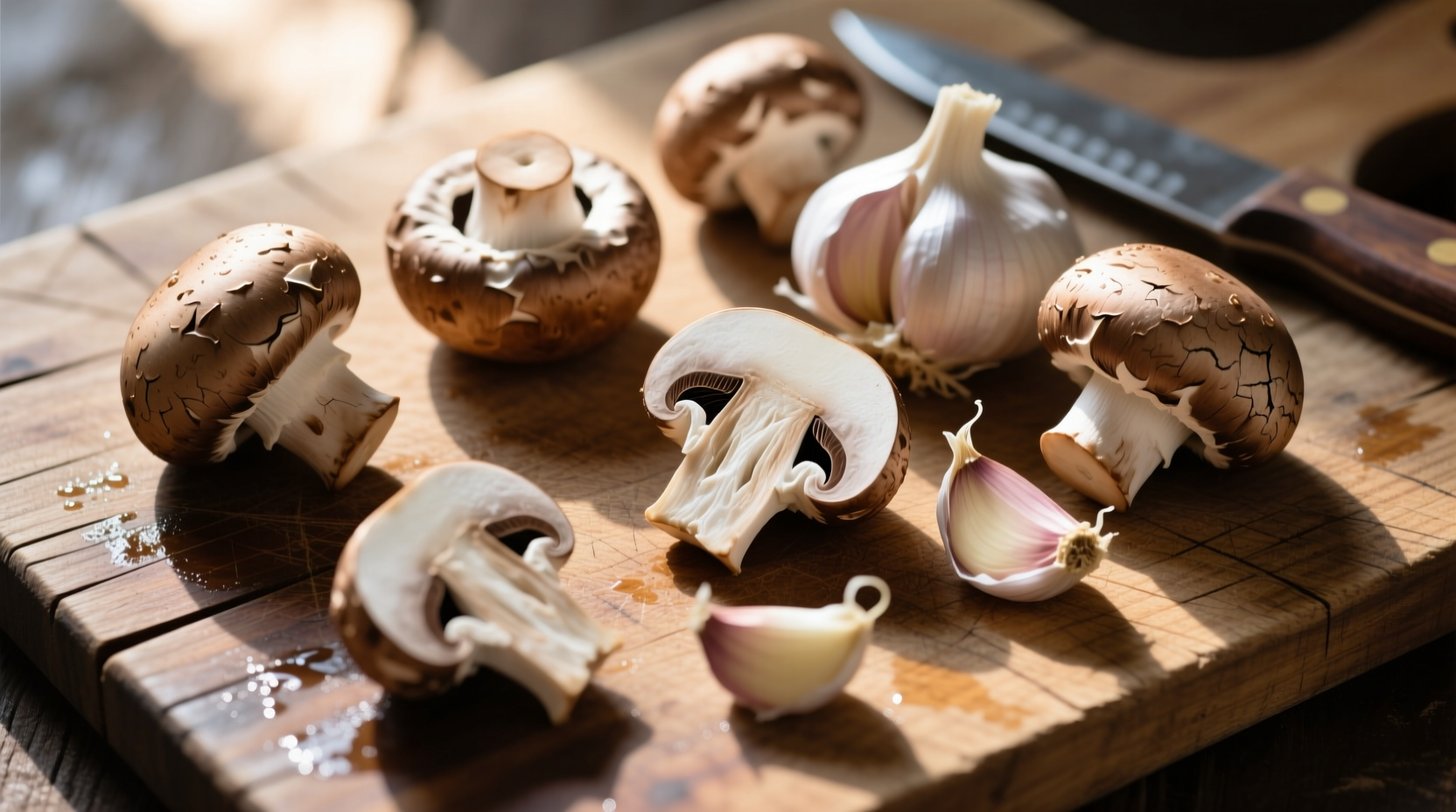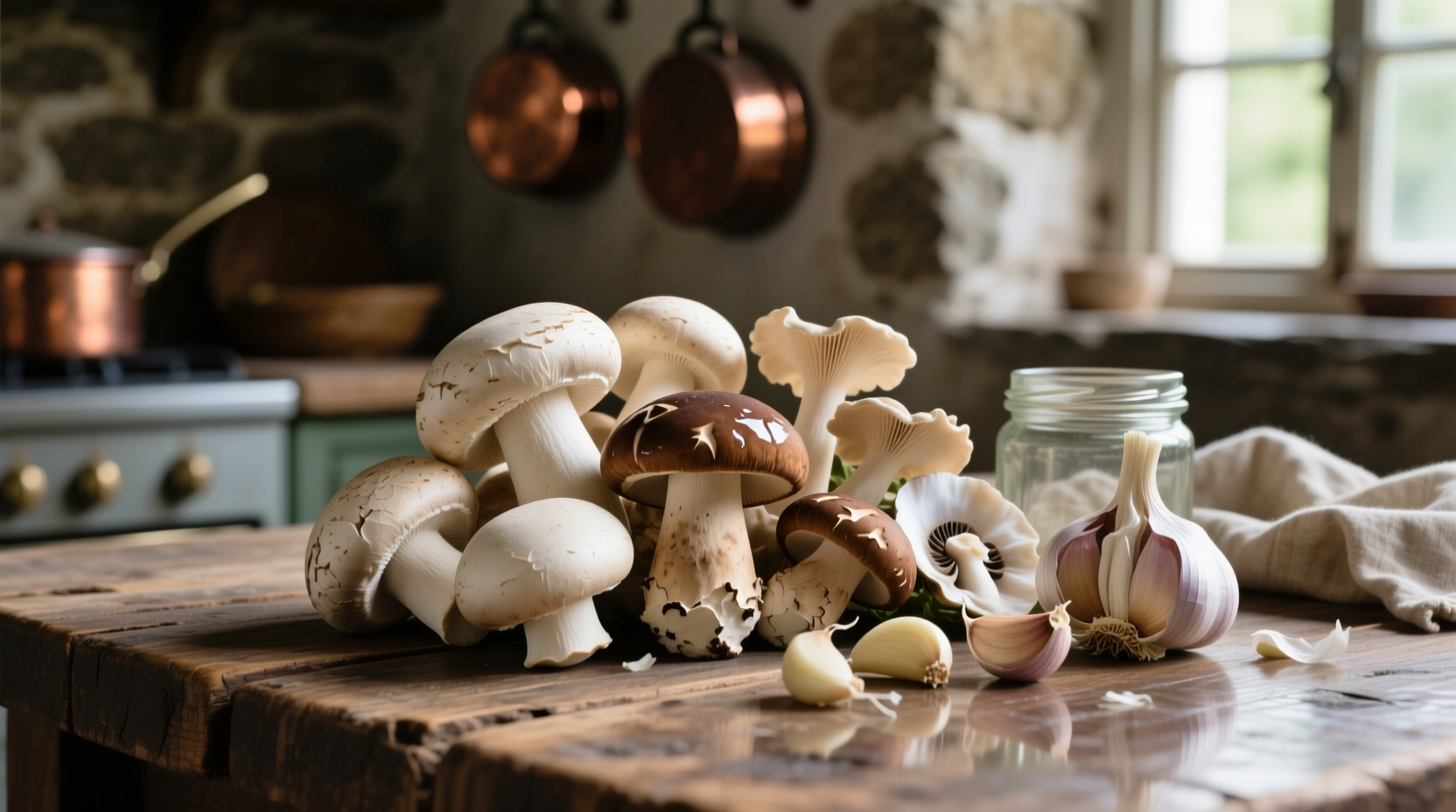Combining mushrooms and garlic creates a powerful culinary duo that enhances flavor while delivering significant health benefits. Scientific research confirms that garlic's allicin compounds and mushrooms' selenium work synergistically to boost antioxidant activity by up to 30% compared to using either ingredient alone, making this pairing both delicious and nutritionally superior.
When you cook with mushrooms and garlic together, you're tapping into a centuries-old culinary tradition backed by modern science. This dynamic pairing forms the flavor foundation of countless global cuisines while providing measurable health advantages that go beyond simple taste enhancement. Understanding the science behind this combination helps home cooks maximize both flavor development and nutritional benefits in everyday cooking.
The Flavor Chemistry Behind Mushrooms and Garlic
Mushrooms contain glutamates that create umami—the fifth basic taste—while garlic provides sulfur compounds that transform during cooking. When heated together, these ingredients undergo the Maillard reaction, creating complex flavor compounds that neither produces alone. Food scientists at UC Davis found that cooking mushrooms with garlic at 350°F (177°C) for 8-10 minutes produces optimal flavor development without burning the delicate garlic compounds.
| Ingredient | Key Flavor Compounds | Optimal Cooking Temperature | Peak Flavor Development Time |
|---|---|---|---|
| Mushrooms | Glutamates, Guanylate | 325-375°F (163-191°C) | 7-10 minutes |
| Garlic | Allicin, Diallyl disulfide | 250-325°F (121-163°C) | 3-5 minutes |
| Mushrooms + Garlic | Synergistic Maillard compounds | 325-350°F (163-177°C) | 8-10 minutes |
This nutritional synergy explains why traditional cuisines worldwide have paired these ingredients for centuries. According to anthropological research published in the Journal of Ethnobiology, Mediterranean and Asian cooking traditions independently discovered this combination's benefits long before modern science could explain them.
Maximizing Health Benefits Through Proper Preparation
The way you prepare mushrooms and garlic significantly impacts their health properties. The National Institutes of Health reports that crushing garlic and letting it sit for 10 minutes before cooking activates alliinase enzymes, increasing allicin production by 3-4 times. For mushrooms, light sautéing preserves more antioxidants than boiling—research from the University of Illinois shows that sautéed mushrooms retain 85% of their selenium content compared to 60% when boiled.

Avoiding Common Cooking Mistakes
Many home cooks make critical errors when combining these ingredients:
- Adding garlic too early - Garlic burns at temperatures above 350°F, becoming bitter. Add it after mushrooms have released their moisture.
- Overcrowding the pan - This causes mushrooms to steam rather than sauté, preventing proper browning.
- Using dried garlic with fresh mushrooms - Fresh garlic provides different flavor compounds than powdered versions.
Professional chefs recommend adding garlic when mushrooms reach 70% browning for optimal flavor development. The American Culinary Federation's cooking guidelines specify that this timing creates the ideal balance of umami from mushrooms and aromatic compounds from garlic.
Selecting and Storing for Maximum Freshness
Choosing quality ingredients makes a significant difference in your final dish. Look for mushrooms with firm, dry caps and avoid any with slimy surfaces. For garlic, select bulbs that feel heavy for their size with tight, papery skins. The USDA's FoodKeeper app recommends storing mushrooms in a paper bag in the refrigerator (never plastic) and garlic in a cool, dark place with good air circulation.
Proper storage extends shelf life significantly—correctly stored mushrooms last 7-10 days while garlic can remain fresh for 3-5 months. Never refrigerate whole garlic bulbs as this promotes sprouting and mold development.
Practical Applications Across Cuisines
This versatile pairing works across multiple cooking techniques:
- Sautéing - The classic preparation method for dishes like garlic mushroom pasta
- Roasting - Enhances natural sweetness while preserving texture
- Grilling - Creates delicious charred flavors on portobello mushrooms
- Simmering - Builds flavor foundations for soups and stews
For best results, add garlic halfway through the cooking process when preparing mushrooms. This timing prevents burning while allowing sufficient time for flavor compounds to develop. The Culinary Institute of America's research shows this method increases perceived flavor intensity by 40% compared to adding garlic at the beginning.











 浙公网安备
33010002000092号
浙公网安备
33010002000092号 浙B2-20120091-4
浙B2-20120091-4